‘’Overcoming limitations is as important as getting out of our comfort zone. Victimizing ourselves and hanging on to excuses are never an option if success is the goal’’.
Shaikh Raziya
Ditty Maria Dominic and Bhuvana N interacted with Shaikh Raziya, to understand how Bastar Food Firm and Consultancy Services is impacting lives by working closely with local communities, artisans, and small-scale producers to source, process and market the highest quality forest minor produces that showcase the authentic essence of Bastar.
|
Bastar Food Firm & Consultancy Services (BFFCS) is a start-up venture started in Bastar district of Chhattisgarh state, India, in 2017. It is a private venture started by Shaikh Raziya to bring food technologies through Research & Development to the tribal belt of Bastar and surrounding areas in Chhattisgarh (https://bastarfoods.com/) |
Can you give us a brief background about yourself and how you decided on your enterprise?
I was born and brought up in Bastar, Chattisgarh. Following my graduation and post-graduation in microbiology, I taught for a while. As my family was keen on my becoming a civil servant, I went to Hyderabad to prepare for the UPSC examination. But I soon realized it was not my calling and returned to my village. When I couldn’t find a job in Bastar, I knew I had to start my own enterprise but could not decide on what to do. I was offering food consultancy services for a few food processing firms of my friends and my client base was growing. This made me realize the potential of starting a consultancy.
This was the time that Sarada Ram Krishna Sevashram in Bastar was doing a project under the Safe Motherhood Initiative. The director of Sarda Ram Krishna Sevashram, Mr Amit Sen Gupta, is a mentor who asked me to work on the project. My work there provided a clear view of the lives of Adivasi women in Bastar. Women and youth in these tribal areas face huge unemployment. I was hit by the harsh reality when a young boy told me that the easiest option for them to gain employment was to join naxalite groups, where they get a monthly salary of INR 20,000. The youth there are clueless on how to get a job and have nobody to guide them. This dismal situation led me to ruminate on how I could provide employment to these underprivileged people. I started learning about various government schemes pertaining to entrepreneurship, tribal development, rights and culture of tribal communities and other aspects. I found that a food-based enterprise would have great scope in Bastar, as it can derive value from locally available forest minor produce. But I did not want to confine my business to food processing alone. So, given my experience in consultancy and the scope of food processing, I founded Bastar Food Firm and Consultancy Services (BFFCS) in 2017.
Take us through your journey from conception to setting up of BFFCS.
The major objective of setting up BFFCS was to create livelihood opportunities for tribal people and youth from insurgency-prone areas and unprivileged backgrounds. It was thus designed as a platform where youth/women can showcase their ideas/skills so that we can support them. My intention was creating jobs in the jungle by making use of forest minor produce so that people don’t have to migrate to other cities or join naxalite groups for jobs.
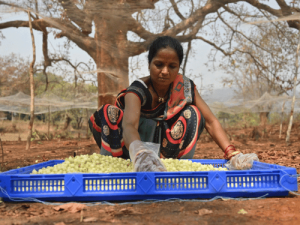 Cleaning of mahua flowers
Cleaning of mahua flowers
But the initial days were challenging. I was looking for loans and grants to set up my office-cum-food processing unit, but could not find any. So, I was engaged in providing consultancy services to food processing firms and skill training for rural women and youth. I was saving up from these activities to invest in a food processing unit. By the end of 2020, I established a manufacturing unit. I was researching and formulating recipes for products that can be made using forest minor produce, which would be something new as well as healthy for customers in cities. Bastar is famous for mahua flowers; they are a “Dawa to Daaru” and way of life for tribals in Bastar. Considering its inimitable health benefits and its abundance in forests, I started formulating recipes using mahua. Our first branded product was Mahua ladoo which was a roaring success in the market. Currently, we have 20 value-added products of mahua as well as other forest minor products. We designed products for every segment of customers, from babies to the geriatric, like mahua cookies, daliya, mahua tea, wild honey, rasam powder, energy bars, dheki rice, tamarind sauce, etc.
 Different products of Bastar Foods
Different products of Bastar Foods
What is the process you follow from procuring raw material to processing and packaging?
Our main raw material is mahua, which we procure from around 300 tribal women in 10 districts of Chattisgarh and Madhya Pradesh. We are connecting to tribal people with the support of the Department of Forests. We share short videos on Standard Operating Procedures (SOPs) for collecting and handling raw material with the tribal community through officials of the Department of Forests, so that the quality of the raw material is maintained while it is collected or cultivated. Other than mahua, we also procure dheki rice, tamarind, millets, turmeric, and chillies. These raw materials are processed in our processing unit which has eight women employees. We make sure there is no compromise on the quality of the raw materials as well as finished products. Our lab for testing the quality of our products is managed by a food technologist; we also link up with other labs for quality testing.
How are the products marketed? Do you use digital technologies to reach potential customers?
In the international market, there is a huge demand for tribal foods sourced from indigenous communities, mainly after the COVID-19 pandemic, as people are more health conscious. So, the export market is our main target currently. Last year we exported 12 tons of mahua and this year we are exporting around 70 tons to London and 15 tons are for the domestic market. Domestic marketing is done mainly through digital marketing platforms as our target customers are the urban population.
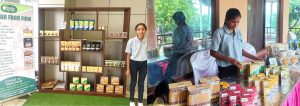 Promotion and marketing of products
Promotion and marketing of products
Our website (https://bastarfoods.com/) is where customers can find details about the products to order through Whatsapp. Our products can also be found on e-commerce platforms like Amazon, Tribesindia, Lokabazar, Amazon, Flipkart and Meesho. We also get orders through Instagram and Facebook. A person recruited to manage our social media platforms and digital marketing submits weekly reports on the digital marketing strategies implemented, customer response, product reach, etc. We also supply our products to Tribal Cooperative Marketing Development Federation (TRIFED) stores, Central Reserve Police Force (CRPF) canteens, police canteens, National Mineral Development Corporation (NMDC) Co-operative societies and Forest department general stores.
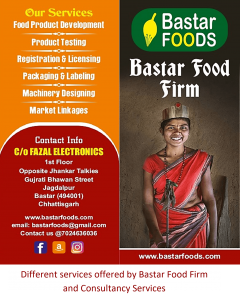 Other than food processing, what other activities does BFFCS undertake?
Other than food processing, what other activities does BFFCS undertake?
In addition to our product offerings, Bastar Foods also provides customized consultancy services. Our team with extensive knowledge of the Bastar region and its culinary traditions, provides guidance and support to individuals or businesses in product development, market research, and in business strategy development. We offer comprehensive business training programs designed to equip aspiring entrepreneurs with the knowledge and skills needed to succeed in the food industry. We provide practical insights on various aspects of business management, including marketing strategies, supply chain management, financial planning, and more. We work closely with local entrepreneurs, fostering fair trade practices and providing a platform for their exceptional products to reach a wider audience.
Can you tell us more on the trainings given to tribal women?
Tribal women may not be educated but they have native knowledge about forest minor produce and traditional recipes. Our aim is to integrate their knowledge with technology. So we train these women in hygienic food processing practices, food loss and other food handling aspects. We teach them the recipes of our products also. Along with raw materials collected or cultivated by them, like mahua, tamarind and wild honey, we also procure finished products if they meet our quality standards. To date we have trained around 3000 women from various districts in Chattisgarh. Around 300 women have taken up value addition activities after receiving our training. These women can either market their products to us or sell them through the Madhuvania brand of Chattisgarh government which promotes the sale of products from forest minor producers.
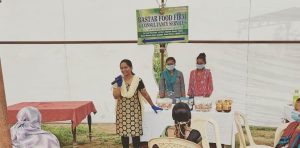 Training on food processing given to tribal women
Training on food processing given to tribal women
In what activities is BFFCS collaborating with the Government?
BFFCS has collaborated with Government departments (Forest Department, TRIFED, etc) to establish eight food processing units in Chattisgarh under various livelihood promotion schemes.
The government invests money and BFFCS takes care of setting up the processing unit, training, licensing, raw material sourcing, processing, packaging, and marketing. Once the unit is well established and sustainable, we handover the operations back to the government departments. These units are mainly for people from tribal communities, so that they can bring their produce, process it at a nominal fee and make a livelihood out of selling them. This is how the government is promoting micro-enterprises in tribal areas.
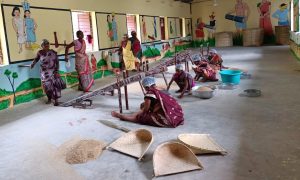 Winnowing of Dheki rice at the processing unit established in collaboration with the government
Winnowing of Dheki rice at the processing unit established in collaboration with the government
How do you keep yourself updated?
Attending trainings, conferences and exhibitions are part of my routine to keep myself updated. I have attended three training in the past three years conducted by the National Agriculture and Food Analysis Research Institute (NAFARI), Pune. The training sessions were on food adulteration, mechanization, Hazard Analysis Critical Control Point (HACCP), and other general aspects of food technology. Most of my learning occurs while attending exhibitions and conferences where I meet other entrepreneurs, learn what they are doing differently, and clarify my queries. I always take my team with me for these events so that they can also learn, explore and come up with new ideas.
What challenges did you face in your entrepreneurial journey?
My major challenge was the lack of financial support. Initially I didn’t get a loan. My enterprise was completely bootstrapped and I invested Rs 10 lakhs from my savings to begin with. Recently I got Rs 15 lakhs as loan with a 35% subsidy under a scheme of the Ministry of Food Processing Industries. Team management is the second major challenge. Aligning the objectives of the team members with those of the organization is difficult at times. Every entrepreneur should be skilled enough to convince the team to work based on plans.
Working with the government sector is another challenge. I think it is hard to convince it of a woman’s idea than a man’s idea. Convincing bank and forest department officials was tough initially. Travelling is costly as well as risky in forest areas like Bastar and is another challenge. I am constantly on travel to procure raw materials and give trainings to tribal women. Obtaining adequate quantity of quality raw material is another challenge we face. This year our target was to procure 300 tons of raw material but we could procure only 80 tons, as we could not get quality produce due to erratic rains. Penalty from e-commerce websites like Amazon is also a major issue. Bastar being a remote village, delivery personnel find it difficult to pick up products from us on time; this delays product delivery to customers. But ultimately, we have to pay the penalty even though it is not our fault. COVID-19 also created several challenges, as we were not able to export or market our products domestically. Yet we didn’t shut down our unit completely. As a service, we started distributing mahua-based products free of cost to COVID-19 patients, for which we got very positive feedback from them. During the pandemic we also conducted online trainings and consultancy services. All these challenges have served as learning experiences for me.
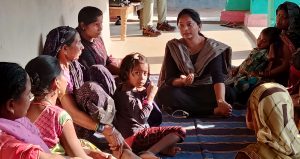 In conversation with tribal women about hygienic handling of raw materials
In conversation with tribal women about hygienic handling of raw materials
Any significant personal achievements which you would like to share with us?
I participated in the TiE conference in San Francisco as a Motwani Jadeja Foundation 2019 fellow, where I could present my work before academicians from top universities and other successful entrepreneurs from around the world. I was also selected by NITI Aayog in 2019 as one of the 30 women transforming India.
What is the turnover of your enterprise?
I started my enterprise with Rs 200 and currently the total turnover is Rs 25 lakh.
What is your message to aspiring women entrepreneurs?
I have messages for both aspiring women entrepreneurs and policy makers. To women entrepreneurs I would say that taking up entrepreneurship in itself is a difficult task and being a woman adds to the challenge. But, with focus and determination it is very doable. Convincing others to believe in your ideas may be difficult initially. Believe in yourself and show them what you are capable of. Make sure you are impacting lives through your enterprise, and that should be your measure of success.
I would like policy makers to craft effective strategies that support women entrepreneurs in taking up digital tools. Scaling up can be done only if enterprises have a strong digital footprint. However, many micro-entrepreneurs lack the knowledge, capacity and resources to use digital tools. So, even small steps like conducting digital marketing courses in the local language would be a great support to entrepreneurs.
Acknowledgement: This interview was done as part of the IRRI-CRISP ongoing project “Mapping of Good Practices in Digital innovations in India Supporting Women Agrientrepreneurs”.
 Ditty Maria Dominic, Research Fellow at Centre for Research on Innovation and Science Policy (CRISP), Hyderabad, Telangana, India. She can be reached at: ditty794@gmail.com
Ditty Maria Dominic, Research Fellow at Centre for Research on Innovation and Science Policy (CRISP), Hyderabad, Telangana, India. She can be reached at: ditty794@gmail.com
 Bhuvana N, is a Consultant at the Centre for Research on Innovation and Science Policy (CRISP), Hyderabad. She has a PhD in Agricultural Extension, from Professor Jayashankar Telangana State Agricultural University, Hyderabad. Her research interests include organizational ecosystems and effectiveness, social networks and technological change. She can be reached at: bhuvanaditya7@gmail.com
Bhuvana N, is a Consultant at the Centre for Research on Innovation and Science Policy (CRISP), Hyderabad. She has a PhD in Agricultural Extension, from Professor Jayashankar Telangana State Agricultural University, Hyderabad. Her research interests include organizational ecosystems and effectiveness, social networks and technological change. She can be reached at: bhuvanaditya7@gmail.com

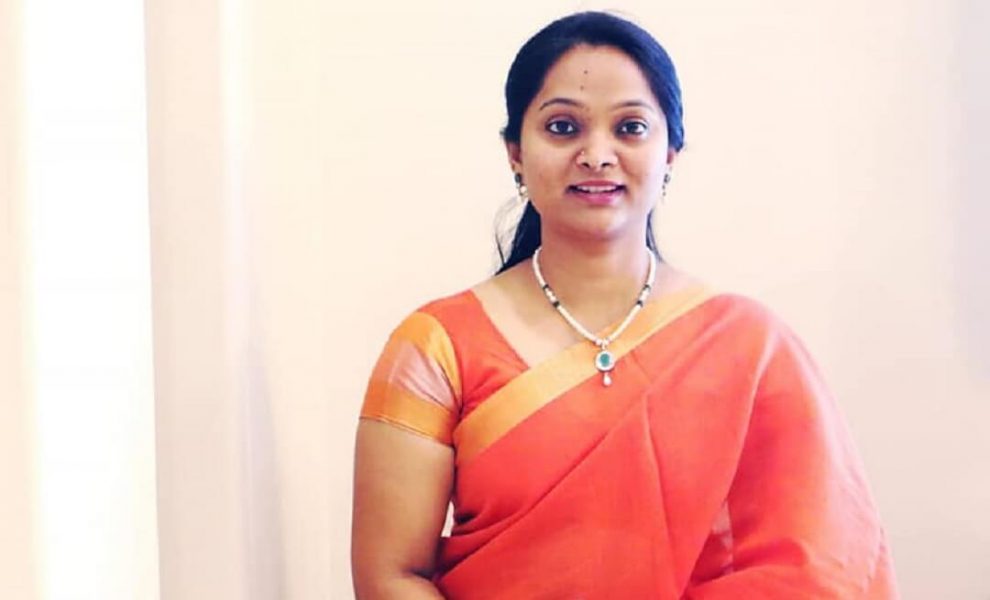



The efforts taken by Ms Shaik Razia in establishing Food Firm and Consultancy services in Bastar, a naxalite prone area is highly laudable. We can very well imagine the bottlenecks she encountered in the initial phases of establishing the enterprise. Those who have sheer grit in surmounting the difficulties only will ultimately succeed. It is good that she stood the ground and succeeded in becoming an entrepreneur and empowering the tribal community.
It is unfortunate that she is still struggling to get the needed support from the Government organisations which are working for the tribal development. I wish Ms Shaik Razia must coordinate with NGOs in addition to Government Departments to expand the scope of development in Jagdalpur.
Congratulations to Ms Shaik Razia and thanks to Ms. Ditty Maria and Ms Bhuvana for coming out with the saga of this budding entrepreneur.